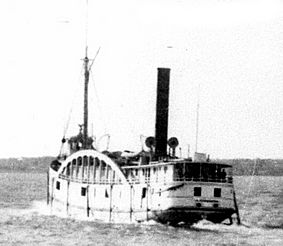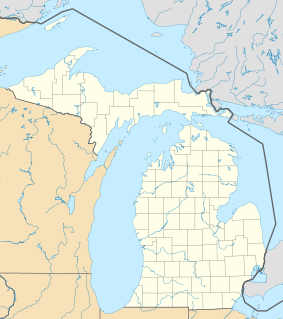Whitefish Point Underwater Preserve facts for kids
Quick facts for kids Whitefish Point Underwater Preserve |
|
|---|---|

The Comet under sail. The only known treasure ship of Lake Superior, she sank in 1875 with 70 tons of silver ore.
|
|
| Location | Lake Superior, Chippewa County, Luce County, Michigan USA |
| Nearest city | Emerson, Michigan |
| Area | 376 square miles (970 km2) |
| Established | 1987 |
| Governing body | Michigan Department of Natural Resources |
The Whitefish Point Underwater Preserve is a special area in Lake Superior, Michigan. It was created in 1987 to protect old shipwrecks and historical items found underwater. This preserve covers about 376 square miles (970 km2) of the lake bottom near Whitefish Point.
The preserve helps keep these shipwrecks safe. Before it was formed, some people would take items from the wrecks. Now, the preserve makes sure these historical treasures stay where they belong. Divers can explore these deep, well-preserved shipwrecks in clear water. It is also one of the few places in the Great Lakes where shipwrecks are not covered by tiny creatures called zebra mussels.
Contents
Shipwreck Alley: A Dangerous History
The area around Whitefish Point is often called the "Graveyard of the Great Lakes." Many ships have been lost here. This started happening more often after the first lock opened on the St. Marys River in 1855. This lock allowed more ships to travel into and out of Lake Superior.
Every ship entering or leaving Lake Superior must pass Whitefish Point. The Whitefish Point Light was built in 1849 and is very important. More ships have sunk near Whitefish Point than anywhere else on Lake Superior. From 1816 to 1975, at least 240 ships were lost here.
Ships often had to squeeze through Whitefish Bay. Bad weather like thick fog, heavy snow, or smoke from forest fires made it hard to see. This, combined with lots of ship traffic, led to many accidents. Lake Superior can also have huge storms with waves over 30 feet (9.1 m) tall. One such storm sank the famous SS Edmund Fitzgerald in 1975, about 17 miles (27 km) from Whitefish Point.
Protecting Underwater Treasures
In the past, some valuable items were taken from shipwrecks in the preserve area. This caused problems because these items are part of history. The State of Michigan wanted to protect these artifacts.
The Whitefish Point Underwater Preserve was created to manage and protect these shipwrecks. It is like an underwater museum. Today, scuba divers and history fans work together to keep the preserve safe. They help make sure these historical sites are preserved for everyone to see and learn from.
Exploring the Preserve
The Whitefish Point Underwater Preserve is a great place for experienced divers. It has clear water and many deep shipwrecks. There are twenty-three known shipwrecks here, lying at depths from 30 feet (9.1 m) to 270 feet (82 m).
Many of the wrecks have special moorings to protect them and make diving safer. Divers can see the shipwrecks without them being covered by zebra mussels, which is rare in the Great Lakes. The water is very cold, so divers often wear Dry suits. Because many dive sites are deep, divers need to be skilled and have the right equipment.
Notable Shipwrecks in the Preserve
Here are some of the shipwrecks you can find in the Whitefish Point Underwater Preserve:
| Site name | Type | Depth | Coordinates | Disaster History |
|---|---|---|---|---|
| Allegheny | Wood schooner | 30 feet (9 m) | 46°46.016′N 85°10.601′W / 46.766933°N 85.176683°W | Stranded at Crisp Point in a gale on 6 June 1913. Crew rescued by Vermilion Point Life-saving Station crew with no loss of life. |
| Comet | Wood propeller steamer tug | 200 feet (61 m) to 230 feet (70 m) | 46°43.02′N 84°52.00′W / 46.71700°N 84.86667°W | Sank 26 August 1875 after colliding with the Manitoba above Whitefish Point with the loss of ten lives. |
| John B. Cowle | Steel propeller bulk freighter | 170 feet (52 m) to 200 feet (61 m) | 46°44.435′N 84°57.877′W / 46.740583°N 84.964617°W | Sank 12 July 1909 in Whitefish Bay after colliding with the Isaac M. Scott with the loss of fourteen lives out of a twenty-four-man crew. |
| Drake | Wood propeller bulk freighter | 40 feet (12 m) to 50 feet (15 m) | 46°46.588′N 85°05.933′W / 46.776467°N 85.098883°W | Foundered 2 October 1901 off Vermilion Point, along with her tow, the schooner, Michigan. Crew of both vessels were rescued by the propellers Northern Wave and Superior City with no loss of life. |
| Eureka | Wood schooner barge | 50 feet (15 m) to 55 feet (17 m) | 46°50.15′N 85°10.76′W / 46.83583°N 85.17933°W | Disappeared 20 October 1886 after separating from the steamer Prentice 5.0 miles (8.0 km) off Vermillion Point with the loss of all 6 crew members. |
| Indiana | Wooden schooner barge | 100 feet (30 m) to 115 feet (35 m) | 46°48.66′N 085°17.16′W / 46.81100°N 85.28600°W | Sank 6 June 1858 40 miles (64 km)above Whitefish Point and 10.0 miles (16.1 km) from shore with the crew of twenty-one taking to the life boats before she sank. |
| Jupiter | Wooden schooner barge | Driven ashore near Vermilion Point 27 November 1872 in an arctic gale when the towline parted from steamer John A. Dix and the schooner Saturn. | ||
| Samuel Mather | Wooden propeller | 140 feet (43 m) to 170 feet (52 m) | 46°34.308′N 084°42.325′W / 46.571800°N 84.705417°W | Sank 21 November 1891 in a collision with the Brazil in off Point Iroquois in Whitefish Bay with no loss of life. |
| John Mitchell | Steel freighter | 120 feet (37 m) to 150 feet (46 m) | 46°50.05′N 85°04.81′W / 46.83417°N 85.08017°W | Sank 10 July 1911 off Whitefish Point in a collision with William Henry Mack with the loss of three lives. |
| Miztec | Wooden schooner barge | 45 feet (14 m) to 55 feet (17 m) | 46°48.073′N 85°04.500′W / 46.801217°N 85.075000°W | Foundered 13 May 1921 off Vermilion Point with the loss of all seven crew. |
| Myron | Wooden propeller, lumber hooker | 45' to 55' | 46°48.463′N 85°01.646′W / 46.807717°N 85.027433°W | Foundered 1.5 miles (2.4 km) west of Whitefish Point on 23 November 1919 with barge Miztec in tow. Seventeen lives were lost from the Myron. Only the Captain survived. He was picked up by the W.C. Franz when he was found drifting on wreckage near Ile Parisienne. |
| Neshoto | Wood propeller | 45 feet (14 m) to 55 feet (17 m) | 46°49.173′N 85°07.488′W / 46.819550°N 85.124800°W | Blinded from forest fire smoke, driven ashore and stranded 2.5 miles (4.0 km) east of Crisp Point Light, crew rescued by Crisp Point Life Saving Crew. |
| Niagara | Wood schooner barge | 90 feet (27 m) to 100 feet (30 m) | 46°49.173′N 85°07.488′W / 46.819550°N 85.124800°W | Foundered 7 Sep 1887 after breaking tow from the steamer Australasia 7 miles (11 km) northwest of Whitefish Point Light. All hands, 9 lives, lost. |
| Alexander Nimick | Wood propeller | 100 feet (30 m) | 46°45.743′N 85°12.982′W / 46.762383°N 85.216367°W | Pounded to pieces in 27 feet (8 m) of water on 21 September 1907 after she was stranded on a sandbar near the mouth of the Two Hearted River with the loss of 6 lives. The 11 survivors made it to shore by lifeboat. |
| Ora Endress S. S. | Fish tug | 13 feet (4 m) to 15 feet (5 m) | Capsized and sank about 1 mile (1.6 km) west of Whitefish Point. The Whitefish Point lighthouse keeper and 2 other men rescued all 11 crewmembers. | |
| John M. Osborn | Wooden propeller | 165 feet (50 m) | 46°51.974′N 85°05.210′W / 46.866233°N 85.086833°W | Sank 27 July 1884 in a collision with the Alberta 6 miles (9.7 km) west-northwest of Whitefish Point with the loss of 3 lives. |
| Panther | Wood propeller | 90 feet (27 m) to 110 feet (34 m) | 46°38.301′N 84°48.370′W / 46.638350°N 84.806167°W | Sank 26 June 1916 in a collision in a fog with the James H. Hill off Parisienne Island in Whitefish Bay with no loss of life. |
| Sadie Thompson | Wooden barge | 80 feet (24 m) to 114 feet (35 m) | 46°42.512′N 84°59.856′W / 46.708533°N 84.997600°W | Broke free and sank 1 mile (1.6 km) south of Whitefish Point during the construction of the Harbor of Refuge in 1967. |
| Sagamore | Whaleback barge | 45 feet (14 m) to 65 feet (20 m) | 46°31.085′N 84°37.935′W / 46.518083°N 84.632250°W | Sank 29 July 1901 in a collision with propeller Northern Queen near Point Iroquois in Whitefish Bay with the loss of 2 lives. |
| Saturn | Wood schooner barge | 20 feet (6 m) | 46°45.952′N 85°01.547′W / 46.765867°N 85.025783°W | Pounded to pieces 27 November 1872 after grounding just west of Whitefish Point after breaking her towline with steam John A. Dix and sister Jupiter with the loss of 7 lives. |
| Superior City | Steel freighter | 190 feet (58 m) to 270 feet (82 m) | 46°43.51′N 84°52.37′W / 46.72517°N 84.87283°W | Sank 20 August 1920 after her boilers exploded in a collision with steamer Willis L. King with the loss of 29 lives. |
| Vienna | Wood propeller | 120 feet (37 m) to 148 feet (45 m) | 46°44.46′N 84°57.91′W / 46.74100°N 84.96517°W | Sank 17 September 1873 after a collision with propeller Nipigon about 4 miles (6.4 km) below Whitefish Point with no loss of life. |
| Zillah | Wood propeller | 230 feet (70 m) to 250 feet (76 m) | 46°43.75′N 84°54.97′W / 46.72917°N 84.91617°W | Foundered 4 miles (6.4 km) off Whitefish Point 29 August 1926. Her crew of 14 were rescued by the U.S. Coast Guard and the William B. Schiller. |
 | DeHart Hubbard |
 | Wilma Rudolph |
 | Jesse Owens |
 | Jackie Joyner-Kersee |
 | Major Taylor |


